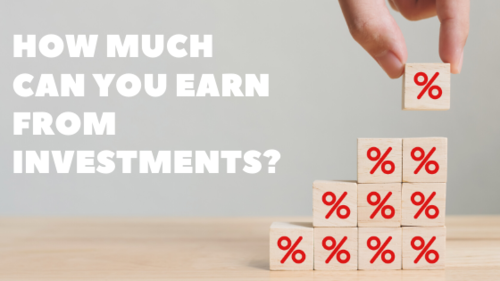How Much Can You Earn From Investments?
How Much Can You Earn From Investments?
As a financial planner, I get a lot of questions about investing returns.
Both brand new investors and experienced investors express that they don't feel clear on what rate of return the investment markets have provided in the past, they don't know what they should expect to earn in their investment accounts.
So...let's tackle the two main questions everyone asks about this:
How much can I earn from my investments?
What's type of investment gets the highest rate of return?
Unfortunately, there's not a straight answer to the first question, because it obviously depends on what you choose to invest in.
There is an evidence-based answer to the second question, though, which I'll explain below.
Before I expound, remember: just because an investment had a certain rate of return in the past does not mean it will provide that same return in the future.
At the same time, past returns give us a framework for what we could expect to earn going forward. And knowing that can tilt the odds in our favor.
Really quick, let me give you a quick rundown on asset classes.
Asset Classes
All the stocks and bonds in the investment markets can be split into different categories we call asset classes.
With stocks, you actually buy shares of ownership in a company. Stock asset classes tend to be created by one or more of the following characteristics of the stock:
Region of the world: U.S., International Developed, Emerging Markets, Frontier markets
Size (capitalization, or "cap" of the company): Large cap, mid cap, small cap
Stock "Style": value, blend, or growth
With bonds, you are actually lending money out to get interest payments back. Bond asset classes tend to be created by one or more of the following characteristics of the stock:
Type: Corporate, Government, Municipal
Region of the world: U.S., International, Emerging Markets
Credit Rating: Investment Grade, High Yield
Period of Time: short-term, intermediate-term, long-term
In many cases, these characteristics will even be combined to indicate an asset class of a more specific set of investments with similar characteristics. For example, "U.S. Large-Cap Growth Fund" or "International Small Cap Value Fund".
You probably have noticed with this that most mutual funds are named in this manner. You'll see a list of asset classes in the table below.
All you need to understand for now about asset classes is that they help us observe the performance or "behavior" of a group of investments that have similar characteristics.
So here's the list, showing annualized return for different investment categories for as far back as we have reliable data:
Historical Returns of Asset Classes
Source: DFA Matrix Book 2019
What do you notice about the numbers above?
One key takeaway you've probably heard before: stocks (equities) earn more than bonds.
But within equities, there are specific areas that have higher rates of return than others.
Here's the same chart, but this time ranked by highest to lowest return:
Source: DFA Matrix Book 2019
Now remember - unless you understand this stuff on a deeper level, don't draw too many conclusions from this chart. Long-term annual returns are important, but it is only a single statistic that doesn't explain everything about how you should invest.
To be more straightforward: don’t just invest your entire portfolio in small cap and real estate just because they’re highest on the chart. Diversification is still the most important principle of investing!
Here's my parting question: if some asset classes - like small cap stocks, real estate, and emerging markets - have performed higher than others over long periods of time, how much are you invested in these asset classes in your own portfolio?
(I find that for most people, the answer is "not very much").
In coming posts, I’ll continue to explore this question and why that is.



